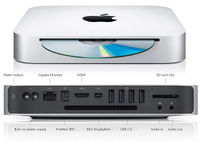Okra
Okra is a Mac Mini server which operates as an Open Directory master for NPG Mac Clients, as well as providing apple file protocol shares for Mac user's home folders. The LDAP database on Okra is a separate LDAP database from the database on einstein. Some similarity exists between the two databases in that User accounts should share the same UID and username across both systems to allow users to have the correct permissions on their files across both systems.
Hardware Details
- Model: Mac mini aluminum
- Processor: Intel Core 2 Duo 2.66 GHz
- L2 Cache: 3 MB
- Memory: 4 GB
- Ethernet Controller: Broadcom 57765
- Wireless Controller: AirPort Extreme (Broadcom BCM43xx) 802.11 a/b/g/n
- Graphics: GeForce 320M 256 MB
- Storage: Hitachi HTS725050A9A362 500 GB 7200RPM x 2
Network Configuration
Okra only has one Ethernet port, so it does not have a Farm interface. Okra also has an Airport wireless interface, but it is not currently used so it has been disabled.
UNH IP Address: 132.177.88.73
Software and Services
Operating System Version: Mac OS X Server 10.6.3
Open Directory (Mac LDAP)
The Open Directory LDAP database on Okra is configured as follows:
- Base DN: dc=physics,dc=unh,dc=edu
- Kerberos Realm: OKRA.UNH.EDU
Okra's Open Directory server has SSL enabled and it should be used by clients connecting to the server. In order to for it to work correctly you may need to get a copy of the SSL certificate when you configure a client system. To do so, follow the instructions here.
Adding New Users
You can manage accounts in the Open Directory database using the Workgroup Manager application. To add a new user account first click the lock in the upper right hand corner and enter the directory admin account username and password (diradmin, password follows the normal system root password scheme). For the most part you just need to enter the user's name, login name and password. If you select "Template" in the Presets menu at the bottom of the screen most of the other settings you need will be automatically configured for you. Make sure to switch to the Home tab and click "Create Home Now" to create the user's home directory.
Be aware that when adding a new user on the Mac system you will need to create a similar Linux user account on einstein.
Before you create the account you need to locate an unused UID for the account. You should use a UID in a similar range to the existing UID numbers in order to avoid user's accounts conflicting with the UIDs of system built-in accounts. In order to find a usable UID number, login to Einstein and run the following command:
$ getent passwd | awk -F ':' '{print $3}' | sort -nr | head -n 20
This will give you a list of the top 20 UIDs in descending order, which should look something like this (ignore the top ridiculously large UID, that's some weird thing Red Hat uses for NFS):
4294967294 5040 5039 5038 5037 5036 5035 5033 5032 5031 5030 5029 5028 5027 5026 5015 5014 4340 4339 4338
You want to select a UID one higher than the highest UID, or find a gap (like the one between 4340 and 5014) and use something in that range. Make sure to set the same username and UID for both the Mac and Linux LDAP accounts for the same user.
Okra shares several data volumes of the apple file protocol. These are:
- /Volumes/Server/Users (afp://okra.unh.edu/Users)
- /Volumes/Store/Shared Items/Backups (afp://okra.unh.edu/Backups)
- /Volumes/Server/Shared Items/Public (afp://okra.unh.edu/Public)
- /Volumes/Server/Groups (afp://okra.unh.edu/Groups)
